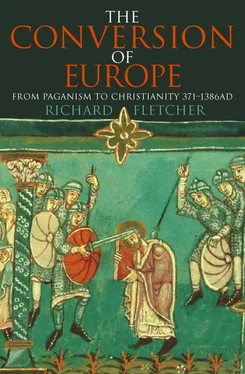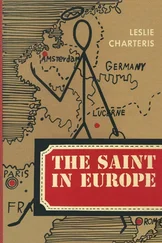As in Ethelbert’s case there was also papal encouragement. There survive two letters from Pope Boniface V (619–25) addressed to Edwin and his consort. 14 The king was urged to abandon paganism and embrace Christianity. The pope made the point early on that Christianity was the faith of ‘all the human race from the rising to the setting of the sun’ – with verbal reminiscence of a key missionary text in Malachi i.ll: because God has melted ‘by the fire of His Holy Spirit the frozen hearts of races even in the far corners of the earth’. Patently mendacious though the writer must have known these words to be – one need look no further than the Jewish communities of the Mediterranean world – the sort of effect that they were intended to have on Edwin is plain. The king was being encouraged to come in, literally, from the cold. Diplomatic presents of rich apparel, gold embroidered, cunningly hinted at the splendid trappings of Christian civilization. Queen Ethelburga was firmly reminded of her duty as wife and queen to bring about Edwin’s conversion. She was sent a silver mirror and an ivory comb ornamented with gold. Perhaps it looked somewhat like the silver-chased comb of her elder contemporary, Queen Theodelinda of the Lombards, now preserved at Monza.
The aftermath of Edwin’s baptism shows features with which the reader will by now be familiar. We see him assisting in the diffusion of Christianity in Northumbria, accompanying Paulinus as he taught and baptized at Yeavering, Catterick and the unidentified Campodunum. Royal ‘assistance’ did not just mean being present. Alcuin, the great eighth-century scholar, wrote of Edwin in his poem on The Bishops, Kings and Saints of York that ‘by gifts and threats he incited men to cherish the faith’. 15 Edwin was active in pressing Christianity upon the rulers subject to him. He ‘persuaded’ (Bede’s word) Eorpwald, son and successor to Redwald of East Anglia, to become a Christian. One may suspect that Paulinus’ success in preaching the word in the kingdom of Lindscy (Lincolnshire) owed not a little to Edwin too. It is just possible that Edwin, like Ethelbert and Clovis, issued laws. This seems to be hinted at in some lines of Alcuin’s poem; but it should be stressed that Bede says nothing of any legislative activity and that no written lawcode attributable to Northumbria survives. Bede tells us something of the peace which Edwin maintained and of the royal state he kept. If historians have made heavy weather of the reference to ‘the standard which the Romans call a tufa and the English a thuuf the point surely for Bede was that there was now some ‘Roman’ quality about Edwin’s style of kingship.
The narrators of these episodes of royal conversion were, of course, churchmen: Gregory of Tours, a bishop; Bede, a monk at Jarrow – what we might call ‘professional Christians’. Is it ever possible to shift the angle of vision and open up a different perspective? Is there, for example, any statement about conversion attributable to a king? By a happy chance there is. It takes the form of a letter from the Visigothic king of Spain, Sisebut, to the Lombard king of Italy, Adaloald, and it was written at much about the time that Ethelburga was travelling north to meet her bridegroom Edwin. The letter was not indeed about conversion from paganism to Christianity but about conversion from one form of Christianity to another. Sisebut was urging Adaloald to abandon Arianism and embrace orthodox Catholicism. 16
Care is always needed in handling writings attributed to royalty. Kings have opportunities denied to others of availing themselves of literary assistance. Whose voice, whose style are we hearing? Not necessarily that of the king. There is a further difficulty. A letter such as this was a public document, a piece of diplomatic correspondence. Surely we should be correct in assuming that even though it ran in the king’s name it would have been drafted by officials. But Sisebut was no ordinary king. He had received an advanced education and was a friend of the polymath Isidore of Seville, who dedicated one of his books to him. It was in response to this gesture that Sisebut honoured Isidore with a Latin verse epistle on the subject of eclipses. Sisebut was also the author, most surprisingly, of a work of hagiography celebrating the life of Bishop Desiderius of Vienne, recently murdered at the instigation of Queen Brunhilde. (There were more sides to her character than the piety to which attention was drawn a few pages back.) Sisebut also wrote a number of letters which have survived and probably more which have not. They are on a variety of subjects ranging from diplomatic correspondence to counselling for a bewildered bishop. Tone and style are even and consistent. I think we may take it that this remarkable man’s letter to Adaloald was his own composition or, at least, expressed his own convictions.
Sisebut was clear about the advantages that had accrued to his people when they had moved from Arianism to Catholicism in 587–9. Before that they had suffered daily from calamity: frequent wars, famine and plague. However, ‘As soon as the orthodox faith had enlightened their darkened minds … God willing, the power of the Goths now thrives. Those who once were torn by the sickled cohorts of thorns, wounded by the barbed stings of scorpions, poisoned by the forked tongue of the serpent, to these atoned ones the Catholic church now devotes her motherly affection.’ It is a long letter, in high-flown diction of which this is a representative sample, and much of it is unsurprisingly taken up with theological argument and scriptural quotation. But at its heart lies the simple boast that ‘the power of the Goths now thrives’. King Sisebut believed that conversion to correctness of religious observance had made his kingdom more powerful. Crude we may think it, but it is consistent with what we have seen elsewhere.
The contemporary written sources bearing upon the conversion of kings prompt reflection on a number of themes. First, we observe the repeated assurance that acceptance of Christianity will bring victory, wide dominion, fame and riches. This was what Germanic kings wanted to hear, because their primary activity was war. It was the easier for the missionaries to preach this with conviction in the light of what the historical books of the Old Testament had to tell about the victorious wars of a godly Israelite king such as David. Not for them the scruples of Ulfila who, it may be recalled (above, p. 77), omitted the books of Kings from the Gothic Bible. Nor would it have profited them to dwell upon facets of Christian teaching which kings might have found unappealing. The injunction to turn the other cheek would surely have fallen on deaf ears if addressed to Clovis. Pope Honorius I urged King Edwin to employ himself ‘in frequent readings from the works of Gregory, your evangelist and my master’. 17 One may wonder whether Paulinus, as he opened his copy of the Moralia or the Liber Regulae Pastoralis , would have thought this the most appropriate juncture to explain that Pope Gregory had taught that rulers should be humble. Bede could tackle the problem of a king, like Edwin, who became very powerful before his conversion to Christianity by claiming this as an augury; in the words of a modern scholar, Edwin got his power ‘on account so to say’. 18 More problematic was the successful king who remained obstinately heathen. Such was Penda, king of the midland kingdom of Mercia, who defeated and killed Edwin in 633. Bede sidestepped the problem by saying as little as possible about him.
Second, we might care to notice the role of the Christian queen in bringing about the conversion of her pagan husband. Here too there was an apposite scriptural reference. ‘The heathen husband now belongs to God through his Christian wife’ (I Corinthians vii.14). St Paul’s words were quoted both by Bishop Nicetius in his letter to Chlodoswintha and by Pope Boniface V in his letter to Ethelburga. This was a role for the queen which was to have a distinguished future. Much later on, when coronation rituals were devised in Francia in the ninth century, it would be emphasized that it was the duty of a queen ‘to summon barbarous peoples to acknowledgement of the Truth’. One may wonder whether we have something of a topos here. How important really was Clotilde in bringing about the conversion of Clovis? We cannot answer this question, it need hardly be said. But there can be no doubting the fact that royal conversions did frequently follow the marriage of a pagan king to a Christian wife.
Читать дальше












